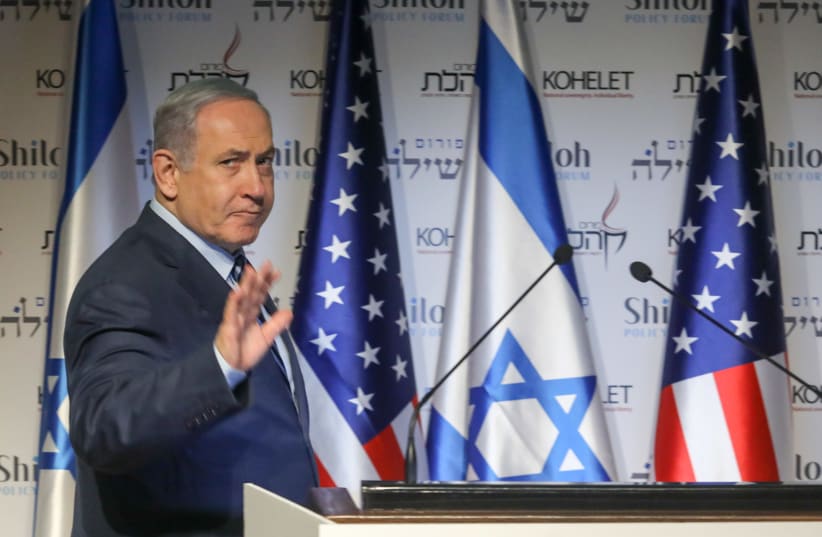Since there is a clear majority in the Knesset opposed to granting immunity to Benjamin Netanyahu, the Knesset House Committee would almost certainly vote down his request, which would pave the way for his indictments to be formally passed to the Jerusalem District Court.
Blue and White, Labor, Democratic Union and the Arab parties have all expressed opposition to granting the prime minister immunity, and Yisrael Beytenu leader Avigdor Liberman made clear as soon as Netanyahu requested it last week that he would also oppose such a measure.
Blue and White leader Benny Gantz said on Friday that as soon as Yinon published an opinion allowing for the committee to be formed his party would begin steps to convene it as soon as possible.
He also warned Edelstein that even if Yinon should rule that the speaker can stop the formation of the committee and Edelstein acted as such, Blue and White would move to oust Edelstein from his position.
“I very much hope that this [formation of the committee] will happen with the agreement of the speaker. And if not, it will happen without him,” said Gantz.
Speaking on Channel 12’s Meet the Press program Saturday night, Liberman issued similar warnings.
“I value the Knesset speaker, but with him or without him we will form the Knesset House Committee,” he said. “Knesset speaker is not a partisan position, and therefore I expect him to act in a statesman-like manner,” adding he was not currently working to remove Edelstein.
The Likud and Netanyahu have strongly opposed the formation of the committee and have lambasted Yinon by claiming that he has a conflict of interests, since his wife works in the state attorney’s office and worked on the criminal cases against Netanyahu.
Once Yinon published last week his legal opinion that the committee could be formed during an interim government and Knesset recess, numerous figures in the Likud called on him to recuse himself from such decisions.
On Saturday night, Netanyahu repeated this call, taking to Facebook to say that Yinon “is in a severe conflict of interests.”
“On the one hand [Yinon’s wife] is prosecuting me, and on the other hand, he is deciding on my defense,” he said.
Yinon has refused to do so, arguing that his decision on the formation of the House Committee and Edelstein’s ability to block it was regarding procedural and technical matters within the Knesset, and had nothing to do with Netanyahu’s criminal cases themselves.
Netanyahu said in his Facebook video that this defense was ridiculous.
“The most famous case in the history of the country, which both of them are dealing with, and they never talked about it. Do they think we’re stupid?”
PARTY LISTS
The two major decisions that must be made before the deadline for filing election party lists on Wednesday are political unions on the Left and Right.
Significant tensions have been created on the religious Right, as Bayit Yehudi leader and Education Minister Rabbi Rafi Peretz circumvented his party’s natural ally, National Union, to reach a unity agreement with far-right Otzma Yehudit, headed by Itamar Ben-Gvir.
Peretz took this step because he was facing a challenge from National Union leader and Transportation Minister Bezalel Smotrich for the head of a unified religious-Zionist list.
Nonetheless, on Thursday, Peretz and Smotrich announced they had met and made progress on a unity deal.
In a joint statement, the two said the meeting was held “with a positive atmosphere, and they discussed the different political options to prepare the religious-Zionist community for the elections.”
They added that “broad unity” was desirable and they would continue their direct dialogue in the coming days.
On the Left, there are efforts afoot for the Democratic Union and Labor-Gesher parties to unite in light of unfavorable polling, which has both parties worried about not passing the 3.25% electoral threshold.
Although Labor leader Amir Peretz has not been enthusiastic about uniting his party with Meretz, Ynet reported on Thursday that he has allowed unofficial channels to open between the two parties to discuss the option and associates of Peretz and Meretz leader Nitzan Horowitz have already met.
On Saturday night, Labor MKs Omer Bar Lev and Itzik Shmuli both said that they would support a technical unity deal with Meretz.
Shmuli criticized Peretz for stalling on his support for a unity deal Saturday night, saying on Meet the Press, “Running separately will not bring in more seats. Why should we take this chance? It’s irresponsible.”
